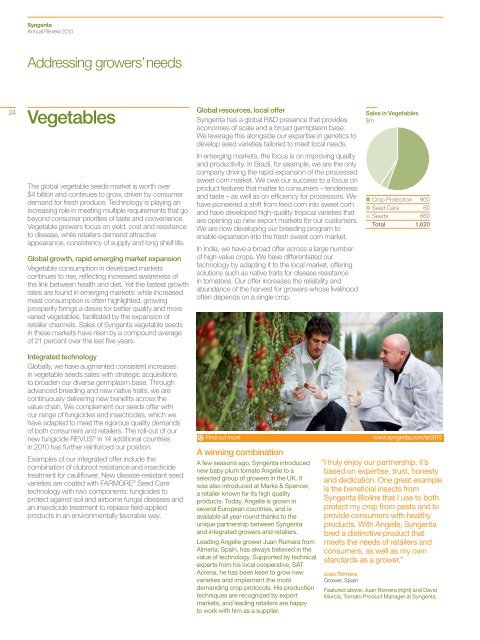Syngenta Annual Review 2010 - CEO Water Mandate
Syngenta Annual Review 2010 - CEO Water Mandate
Syngenta Annual Review 2010 - CEO Water Mandate
Create successful ePaper yourself
Turn your PDF publications into a flip-book with our unique Google optimized e-Paper software.
<strong>Syngenta</strong><br />
<strong>Annual</strong> <strong>Review</strong> <strong>2010</strong><br />
Addressing growers’ needs<br />
24<br />
Vegetables<br />
Global resources, local offer<br />
<strong>Syngenta</strong> has a global R&D presence that provides<br />
economies of scale and a broad germplasm base.<br />
We leverage this alongside our expertise in genetics to<br />
develop seed varieties tailored to meet local needs.<br />
In emerging markets, the focus is on improving quality<br />
and productivity. In Brazil, for example, we are the only<br />
company driving the rapid expansion of the processed<br />
sweet corn market. We owe our success to a focus on<br />
product features that matter to consumers – tenderness<br />
and taste – as well as on efficiency for processors. We<br />
have pioneered a shift from feed corn into sweet corn<br />
and have developed high-quality tropical varieties that<br />
are opening up new export markets for our customers.<br />
We are now developing our breeding program to<br />
enable expansion into the fresh sweet corn market.<br />
In India, we have a broad offer across a large number<br />
of high-value crops. We have differentiated our<br />
technology by adapting it to the local market, offering<br />
solutions such as native traits for disease resistance<br />
in tomatoes. Our offer increases the reliability and<br />
abundance of the harvest for growers whose livelihood<br />
often depends on a single crop.<br />
Sales in Vegetables<br />
$m<br />
The global vegetable seeds market is worth over<br />
$4 billion and continues to grow, driven by consumer<br />
demand for fresh produce. Technology is playing an<br />
increasing role in meeting multiple requirements that go<br />
beyond consumer priorities of taste and convenience.<br />
Vegetable growers focus on yield, cost and resistance<br />
to disease, while retailers demand attractive<br />
appearance, consistency of supply and long shelf life.<br />
Global growth, rapid emerging market expansion<br />
Vegetable consumption in developed markets<br />
continues to rise, reflecting increased awareness of<br />
the link between health and diet. Yet the fastest growth<br />
rates are found in emerging markets: while increased<br />
meat consumption is often highlighted, growing<br />
prosperity brings a desire for better quality and more<br />
varied vegetables, facilitated by the expansion of<br />
retailer channels. Sales of <strong>Syngenta</strong> vegetable seeds<br />
in these markets have risen by a compound average<br />
of 21 percent over the last five years.<br />
Crop Protection 900<br />
Seed Care 60<br />
Seeds 660<br />
Total 1,620<br />
Integrated technology<br />
Globally, we have augmented consistent increases<br />
in vegetable seeds sales with strategic acquisitions<br />
to broaden our diverse germplasm base. Through<br />
advanced breeding and new native traits, we are<br />
continuously delivering new benefits across the<br />
value chain. We complement our seeds offer with<br />
our range of fungicides and insecticides, which we<br />
have adapted to meet the rigorous quality demands<br />
of both consumers and retailers. The roll-out of our<br />
new fungicide REVUS ® in 14 additional countries<br />
in <strong>2010</strong> has further reinforced our position.<br />
Examples of our integrated offer include the<br />
combination of clubroot resistance and insecticide<br />
treatment for cauliflower. New disease-resistant seed<br />
varieties are coated with FarMore ® Seed Care<br />
technology with two components: fungicides to<br />
protect against soil and airborne fungal diseases and<br />
an insecticide treatment to replace field-applied<br />
products in an environmentally favorable way.<br />
Find out more<br />
A winning combination<br />
A few seasons ago, <strong>Syngenta</strong> introduced<br />
new baby plum tomato Angelle to a<br />
selected group of growers in the UK. It<br />
was also introduced at Marks & Spencer,<br />
a retailer known for its high quality<br />
products. Today, Angelle is grown in<br />
several European countries, and is<br />
available all year round thanks to the<br />
unique partnership between <strong>Syngenta</strong><br />
and integrated growers and retailers.<br />
Leading Angelle grower Juan Romera from<br />
Almeria, Spain, has always believed in the<br />
value of technology. Supported by technical<br />
experts from his local cooperative, SAT<br />
Acrena, he has been keen to grow new<br />
varieties and implement the most<br />
demanding crop protocols. His production<br />
techniques are recognized by export<br />
markets, and leading retailers are happy<br />
to work with him as a supplier.<br />
www.syngenta.com/ar<strong>2010</strong><br />
“I truly enjoy our partnership: it’s<br />
based on expertise, trust, honesty<br />
and dedication. One great example<br />
is the beneficial insects from<br />
<strong>Syngenta</strong> Bioline that I use to both<br />
protect my crop from pests and to<br />
provide consumers with healthy<br />
products. With Angelle, <strong>Syngenta</strong><br />
bred a distinctive product that<br />
meets the needs of retailers and<br />
consumers, as well as my own<br />
standards as a grower.”<br />
Juan Romera<br />
Grower, Spain<br />
Featured above: Juan Romera (right) and David<br />
Murcia, Tomato Product Manager at <strong>Syngenta</strong>.











